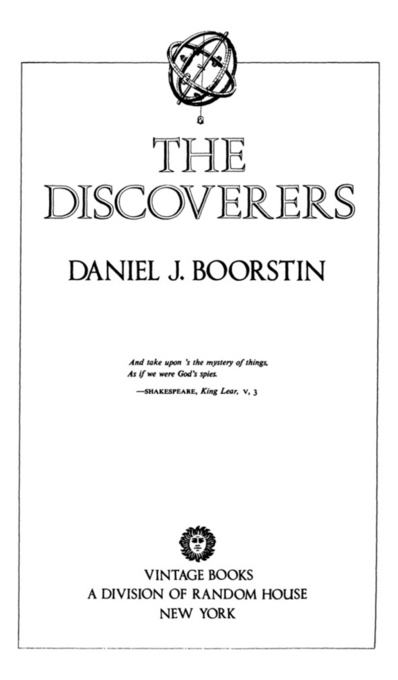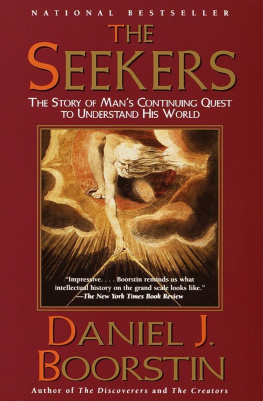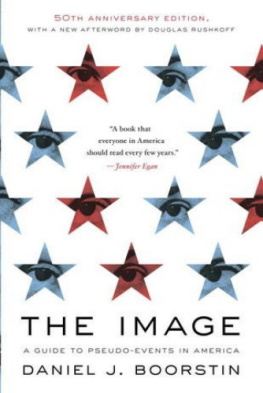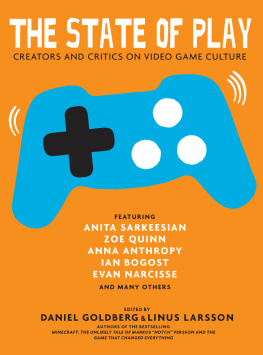Daniel J. Boorstin - The Knowledge Trilogy: The Discoverers, The Creators, The Seekers
Here you can read online Daniel J. Boorstin - The Knowledge Trilogy: The Discoverers, The Creators, The Seekers full text of the book (entire story) in english for free. Download pdf and epub, get meaning, cover and reviews about this ebook. year: Various, publisher: Random House, Vintage, genre: Religion. Description of the work, (preface) as well as reviews are available. Best literature library LitArk.com created for fans of good reading and offers a wide selection of genres:
Romance novel
Science fiction
Adventure
Detective
Science
History
Home and family
Prose
Art
Politics
Computer
Non-fiction
Religion
Business
Children
Humor
Choose a favorite category and find really read worthwhile books. Enjoy immersion in the world of imagination, feel the emotions of the characters or learn something new for yourself, make an fascinating discovery.
- Book:The Knowledge Trilogy: The Discoverers, The Creators, The Seekers
- Author:
- Publisher:Random House, Vintage
- Genre:
- Year:Various
- Rating:5 / 5
- Favourites:Add to favourites
- Your mark:
- 100
- 1
- 2
- 3
- 4
- 5
The Knowledge Trilogy: The Discoverers, The Creators, The Seekers: summary, description and annotation
We offer to read an annotation, description, summary or preface (depends on what the author of the book "The Knowledge Trilogy: The Discoverers, The Creators, The Seekers" wrote himself). If you haven't found the necessary information about the book — write in the comments, we will try to find it.
The Knowledge Trilogy: The Discoverers, The Creators, The Seekers — read online for free the complete book (whole text) full work
Below is the text of the book, divided by pages. System saving the place of the last page read, allows you to conveniently read the book "The Knowledge Trilogy: The Discoverers, The Creators, The Seekers" online for free, without having to search again every time where you left off. Put a bookmark, and you can go to the page where you finished reading at any time.
Font size:
Interval:
Bookmark:
BOOKS BY DANIEL J. BOORSTIN
The Discoverers
*
The Creators
*
The Seekers
*
The Americans: The Colonial Experience
The Americans: The National Experience
The Americans: The Democratic Experience
*
The Mysterious Science of the Law
The Lost World of Thomas Jefferson
The Genius of American Politics
America and the Image of Europe
The Image: A Guide to Pseudo-Events in America
The Decline of Radicalism
The Sociology of the Absurd
Democracy and Its Discontents
The Republic of Technology
The Exploring Spirit
The Republic of Letters
Hidden History
Cleopatras Nose
The Daniel J. Boorstin Reader
The Landmark History of the American People (with Ruth F. Boorstin)
A History of the United States (with Brooks M. Kelley)

FIRST VINTAGE BOOKS EDITION, February 1985
Copyright 1983 by Daniel J. Boorstin
All rights reserved under International and Pan-American Copyright Conventions. Published in the United States by Random House, Inc., New York, and simultaneously in Canada by Random House of Canada Limited, Toronto. Originally published by Random House, Inc., in 1983.
Library of Congress Cataloging in Publication Data
Boorstin, Daniel J. (Daniel Joseph), 1914
The discoverers.
1. CivilizationHistory. 2. Discoveries (in geography) 3. ScienceHistory. I. Title.
CB69.B66 1985 909 84-40056
eISBN: 978-0-307-77355-5
v3.1
FOR RUTH
Nay, the same Solomon the king, although he excelled in the glory of treasure and magnificent buildings, of shipping and navigation, of service and attendance, of fame and renown, and the like, yet he maketh no claim to any of those glories, but only to the glory of inquisition of truth; for so he saith expressly, The glory of God is to conceal a thing, but the glory of the king is to find it out; as if, according to the innocent play of children, the Divine Majesty took delight to hide his works, to the end to have them found out; and as if kings could not obtain a greater honour than to be Gods play-fellows in that game.
FRANCIS BACON , The Advancement of Learning (1605)
M Y hero is Man the Discoverer. The world we now view from the literate Westthe vistas of time, the land and the seas, the heavenly bodies and our own bodies, the plants and animals, history and human societies past and presenthad to be opened for us by countless Columbuses. In the deep recesses of the past, they remain anonymous. As we come closer to the present they emerge into the light of history, a cast of characters as varied as human nature. Discoveries become episodes of biography, unpredictable as the new worlds the discoverers opened to us.
The obstacles to discoverythe illusions of knowledgeare also part of our story. Only against the forgotten backdrop of the received common sense and myths of their time can we begin to sense the courage, the rashness, the heroic and imaginative thrusts of the great discoverers. They had to battle against the current facts and dogmas of the learned. I have tried to recapture those illusionsabout the earth, the continents and the seas before Columbus and Balboa, Magellan and Captain Cook, about the heavens before Copernicus and Galileo and Kepler, about the human body before Paracelsus and Vesalius and Harvey, about plants and animals before Ray and Linnaeus, Darwin and Pasteur, about the past before Petrarch and Winckelmann, Thomsen and Schliemann, about wealth before Adam Smith and Keynes, about the physical world and the atom before Newton and Dalton and Faraday, Clerk Maxwell and Einstein.
I have asked some unfamiliar questions. Why didnt the Chinese discover Europe or America? Why didnt the Arabs circumnavigate Africa and the world? Why did it take so long for people to learn that the earth goes around the sun? Why did people begin to believe that there are species of plants and animals? Why were the facts of prehistory and the discovery of the progress of civilization so slow in coming?
I have included the story of only a few crucial inventionsthe clock, the compass, the telescope and the microscope, the printing press and movable typewhich have been essential instruments of discovery. I have not told the story of the shaping of governments, the waging of wars, the rise and fall of empires. I have not chronicled culture, the story of Man the Creator, of architecture, painting, sculpture, music, and literature, much as these have multiplied the delights of human experience. My focus remains on mankinds need to knowto know what is out there.
The plan of the book as a whole is chronological. In detail it is a shingle scheme. Each of the fifteen Parts overlaps chronologically with its predecessor as the story advances from antiquity to the present. I begin with Time, the most elusive and mysterious of the primitive dimensions of experience. Then I turn to Western mans widening vistas of the Earth and the Seas. On to Naturethe physical objects in the heavens and on earth, plants and animals, the human body and its processes. Finally to Society, finding that the human past was not what had been imagined, to the self-discovery of Man the Discoverer, and to the Dark Continents in the atom.
This is a story without end. All the world is still an America. The most promising words ever written on the maps of human knowledge are terra incognitaunknown territory.

TIME
Time is the greatest innovator.
FRANCIS BACON, OF INNOVATIONS (1625)
The first grand discovery was time, the landscape of experience. Only by marking off months, weeks, and years, days and hours, minutes and seconds, would mankind be liberated from the cyclical monotony of nature. The flow of shadows, sand, and water, and time itself, translated into the clocks staccato, became a useful measure of mans movements across the planet. The discoveries of time and of space would become one continuous dimension. Communities of time would bring the first communities of knowledge, ways to share discovery, a common frontier on the unknown.
THE
HEAVENLY
EMPIRE
God did not create the planets and stars with the intention that they should dominate man, but that they, like other creatures, should obey and serve him.
PARACELSUS , Concerning the Nature of Things (c. 1541)
F ROM far-northwest Greenland to the southernmost tip of Patagonia, people hail the new moona time for singing and praying, eating and drinking. Eskimos spread a feast, their sorcerers perform, they extinguish lamps and exchange women. African Bushmen chant a prayer: Young Moon! Hail, hail, Young Moon! In the light of the moon everyone wants to dance. And the moon has other virtues. The ancient German communities, Tacitus reported nearly two thousand years ago, held their meetings at new or full moon, the seasons most auspicious for beginning business.
Everywhere we find relics of mythic, mystic, romantic meaningsin moonstruck and lunatic (Latin
Next pageFont size:
Interval:
Bookmark:
Similar books «The Knowledge Trilogy: The Discoverers, The Creators, The Seekers»
Look at similar books to The Knowledge Trilogy: The Discoverers, The Creators, The Seekers. We have selected literature similar in name and meaning in the hope of providing readers with more options to find new, interesting, not yet read works.
Discussion, reviews of the book The Knowledge Trilogy: The Discoverers, The Creators, The Seekers and just readers' own opinions. Leave your comments, write what you think about the work, its meaning or the main characters. Specify what exactly you liked and what you didn't like, and why you think so.





